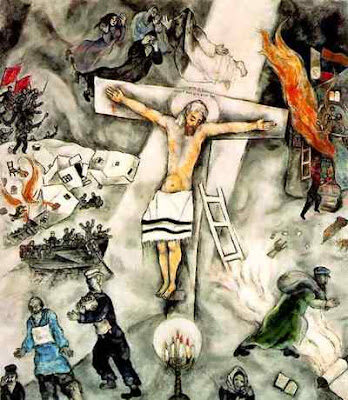There certainly is not one single Jewish view of Jesus. Rather, there are various: from the respectful and empathetic to the malicious and condemnatory. In this essay we simply provide a sampling a various opinions.
In typical Jewish humor Franz Rosenzweig and David Flusser wrote,
Whether Jesus was the Messiah will be shown when the Messiah comes_I do not think many Jews would object if the messiah when he came again was the Jew Jesus.1
Rabbi Morris N. Kertzer:
Jesus’ ministry on earth coincided with the lives of the early Rabbis known as Pharisees. Jews therefore see Jesus as a historical personality whose work and teachings parallel those of other wonder-working Jewish leaders of the time_
The Romans crucified Jesus just as they tortured Rabbi Akiba to death, because they feared the revolutionary effect of their doctrine of love and justice. But Jews stop short of identifying Jesus as in any way divine. Simply put, Jews do not believe that God had a son or appeared in human form_Jews do not quote Jesus as a model, not because we cannot identify with much that he said, but because his life and death are so intrinsically central to Christianity_
Were we to point to Jesus’ behavior or teachings as our guide in life, we would feel as if we were crossing the boundary from Judaism to Christianity. The Lord’s prayer, for instance, has nothing in it with which Jews would not agree. It is a prayer for the coming of God’s reign, a doctrine taught by every Rabbi of the first and second century. But we would not say the Lord’s prayer, since it is part of Christian liturgy, associated firmly with the bedrock of Christian faith. Similarly, Jesus is known to have preached the Golden Rule. But we do not cite Jesus to the effect that we should love our neighbors as ourselves, even though we agree that we should. Instead, we have our own daily prayer called the Kaddish [KAH-dish], which parallels the Lord’s prayer and was formulated about the same time_
It is always hard to second-guess history, but it is interesting to imagine what would have happened if the life of Jesus had not been appropriated by Christianity. What would have happened if he had been remembered only as the Jew he was, but not as the savior? His life might in that case have been retained by Jewish sources. He might well have remained a Jewish moral hero like the Pharisees of the time, who were much like him. But precisely because Jesus was recognized by Christians as the Christ, he could not be recognized as a Jewish role model by those Jews who did not accept his divinity.2
Lawrence J. Epstein:
To Jews, whatever wonderful teacher and storyteller Jesus may have been, he was just a human, not the son of God (except in the metaphorical sense in which all humans are children of God). In the Jewish view, Jesus cannot save souls; only God can. Jesus did not, in the Jewish view, rise from the dead_.
Jesus is not seen as the messiah. In the Jewish view, the messiah is a human being who will usher in an era of peace. We can tell the messiah by looking at the world and seeing if it is at peace. From the Jewish view, this clearly did not happen when Jesus was on Earth or anytime after his death_
No one who is Jewish, no born Jew and no one who converts to Judaism, can believe in Jesus as the literal son of God or as the Messiah. For the Jewish people, there is no God but God.3
See the post Jewish and Christian? Is Messianic Judaism Possible? for some elucidations of Lawrence Epstein’s misconceptions.
Alfred J. Kolatch:
Many Jewish scholars believe that Jesus considered himself a prophet only. They reject the contention of Christian scholars that when Jesus used the phrase “Son of Man” in his preaching (first mentioned in Daniel 7:13, where the Aramaic phrase bar enash is used), he was referring to himself as the Messiah.
The phrase “Son of God,” in the Jewish view, is used in the third person, and more likely than not, when Jesus used the phrase he was referring to someone other than himself. Jewish scholars also point to the fact that there is little evidence in the Synoptic Gospels (Matthew, Mark, Luke)-the earliest accounts of the life of Jesus-that Jesus regarded himself as the Messiah_.According to the doctrine of incarnation, God transformed himself to human life in the form of Jesus. To Jews, who believe that God is One and unchangeable, this doctrine is unacceptable.4
Flavius Josephus, Antiquities of the Jews 18.3.3:
Now there was about this time, Yeshua, a wise man, if it be lawful to call him a man, for he was a doer of wonderful works, a teacher of such men as receive the truth with pleasure. He drew over to him both many of the Jews and many of the Gentiles.
He was Mashiach; and when Pilate, at the suggestion of the principal men amongst us, had condemned him to the cross, those that loved him at the first did not forsake him, for he appeared to them alive again the third day, as the divine prophets had foretold these and ten thousand other wonderful things concerning him; and the tribe of “Christians,” so named from him, are not extinct at this day.
For an elucidation of the controversy over this text please see Paul L. Maier’s Josephus and Jesus
Pinchas Lapide:
In none of the cases where rabbinic literature speaks of such visions did it result in an essential change in the life of the resuscitated or of those who had experienced the visions_
It is different with the disciples of Jesus on that Easter Sunday_
If the defeated and depressed group of disciples overnight could change into a victorious movement of faith, based only on autosuggestion or self-deception-without a fundamental faith experience-then this would be a much greater miracle than the resurrection itself.5
I accept Jesus as a believing Jew who had a central role to play in God’ plan of salvation and in whose name a worldwide church was founded.6
Jacob Bernadagus:
The Message of Jesus was stated within the context of Jewish thought at the time. His ethics and his faith were within the prophetic tradition; the only point at issue was whether or not he was the expected Messiah, or “son of man.”7
Rabbi Abba Hillel Silver:
The Jews did not reject the God concept of Jesus, for that was Jewish in essence and Jesus derived it from the Torah. “The New Testament adds nothing to the content of the ideas of God which is not already present in the literature and faith of Israel. It is often argued that Jesus held a unique conception of God, by which is usually meant the father hood of God. We have seen, however_that the divine characteristics which the term ‘fatherhood’ denotes are fully evident in the Old Testament.”(1)_
“In what way did the teaching of Jesus differ from that of his contemporaries?” query the editors of The Beginnings of Christianity, and they reply: “Not by teaching anything about God essentially new to Jewish ears. The God of Jesus is the God of the Jews, about whom he says nothing that cannot be paralleled in Jewish literature. Nor was it in his doctrine as to the Kingdom of Heaven that Jesus differed markedly from the Jewish teachers.(2)”8
Footnote: (1) Otto J. Baab, The Theology of the Old Testament (1949), p. 270
(2) F.J. Foakes Jackson and Krisopp Lake, The Beginnings of Christianity, I, 288-289
As regards Sabbath observance-“that the Sabbath was made for man and not man for the Sabbath” (Mark 2:27)-this did not represent any break with the basic attitude of Pharisaic Judaism. In the second century of the Common Era [C.E. or A.D.], when Sabbath laws had been elaborated much further by the Rabbis and culminated in the thirty-nine chief categories of prohibited work, R. Jonathan b. Joseph (2 c.) employed the almost identical words of the Gospel: “The Sabbath is committed to your hands, not you to its hands [Yoma 85b].”
Both the Gospel and the Rabbis were probably quoting a popular folk saying in vogue among the people. It was an established principle that in the case of danger to human life, in war, in sickness or accident, all the laws of the Sabbath may be suspended. Even when the danger was not clear, the Sabbath law was to be suspended. Quick action in its suspension is praised, delay condemned [J. Yoma 8:5].
Jesus’ controversy with the Pharisees over the charge that his disciples plucked ears of corn unlawfully on the Sabbath day and ate them because they were hungry (Mark 2:23-28) could have involved no real difference of opinion as regards the law. Such action could quite properly be justified under the law on the ground that it was necessary to preserve life.
This is true also of the other Gospel references to the Sabbath. They are rather the reflections of the antinomist controversy, developed in later times by other men, which sought to establish that “the Son of man is Lord even of the Sabbath day’ (Matt. 12:8), that he could abolish the Biblical law of the Sabbath altogether, as well as all other laws, and that ‘Christ has redeemed us from the curse of the law” (Gal. 3:13).9
Julius H. Greenstone:
In the Psalms of Solomon [circa 70 and 40 B.C.E. (B.C.)]_The Messiah is represented as purging Jerusalem of its sins_Though conceived as pure from sin and constantly sustained by God’s holy spirit, he is still taken to be only a temporary ruler.
The author of the Similitudes of the Ethiopic Book of Enoch makes the Messiah almost a supernatural being, gives him titles, which were later applied to Jesus in the New Testament, such as “the anointed,” “the elect one,” “the righteous one,” “the son of man.” It regards him as penetrating the deepest mysteries and possessing the power of reviving the dead, and accords him a place in the immediate presence of God.10
Joseph Klausner:
in his ethical code there is a sublimity, distinctiveness and originality in form unparalleled in any other Hebrew ethical code.11



